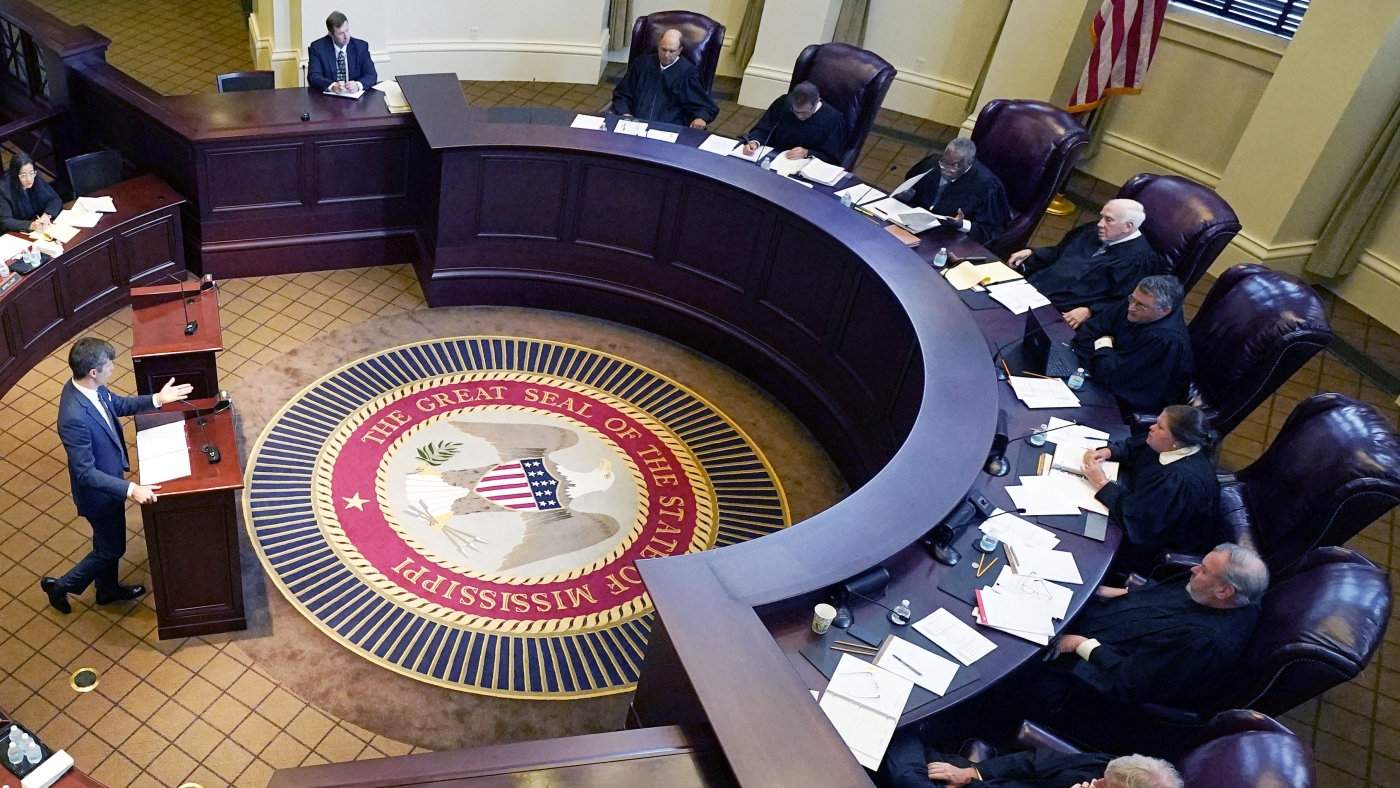
California Gov. Gavin Newsom speaks during a news conference to kick off the Yes on 50 campaign at the California Democratic Party headquarters on Aug. 21 in Sacramento. The ballot measure will ask the state's voters to approve a new congressional map created by Democrats. Justin Sullivan/Getty Images hide caption
toggle caption
Justin Sullivan/Getty Images
The California ballot measure that will ask voters whether they approve a new congressional map created by Democrats, temporarily working around the state's independent redistricting commission, specifically mentions Texas Republicans' new districts in the measure's title.
It's a sign of how unique this ballot push is.
The California vote is part of a larger political battle set off by President Trump. At Trump's request, Texas Republicans recently redrew their state's congressional seats to create five more favorable districts for the GOP, which could help the party maintain control of the U.S. House. On Friday, Missouri legislators approved a new map, and other GOP-led states may do the same.
In response, California lawmakers — led by Gov. Gavin Newsom — want to counter Texas' effort by creating five more favorable seats for Democrats. But voters have to approve a ballot measure first.
The language for that ballot question has been finalized. According to the California secretary of state's office, there were "no court-ordered changes or challenges" to the language.
So, here's the ballot title voters will see for this proposal: "AUTHORIZES TEMPORARY CHANGES TO CONGRESSIONAL DISTRICT MAPS IN RESPONSE TO TEXAS' PARTISAN REDISTRICTING. LEGISLATIVE CONSTITUTIONAL AMENDMENT."

California Secretary of State. Annotation by NPR
An "extremely rare" ballot measure
Dane Waters, founder and chair of the Initiative and Referendum Institute at the University of Southern California, said there are some aspects of this measure that are "extremely rare."
For one, Waters said, it's unusual that lawmakers would put something on the ballot that "supersedes what the voters had already approved," referring to the independent redistricting commission that voters passed in 2008 and 2010.
Second, it's also peculiar for lawmakers to refer to what another state is doing as a reason for a referendum.
"I don't know of another example where there's been a ballot title question put to the people where [it] specifically references something that happened in another state or is happening in another state," Waters said.
And last, he said, the language is explicitly partisan.
"The way this ballot title is drafted is extremely rare," he said. "And it's really, in my opinion, playing on people's emotions about how they feel about a red state versus a blue state."
Chris Melody Fields Figueredo — executive director of the Ballot Initiative Strategy Center, a group that helps left-leaning groups pass ballot measures — said this atypical measure is a reaction to the uniqueness of the current political climate.
"What has happened in Texas is not normal," she said. "And California, they are looking at, what are the ways that they may have to counter that process. So, this is very different. This is ... something I certainly haven't witnessed in the 25 years that I've been doing this work."
For Ted Rossier, a lecturer at the University of North Georgia and a former Oklahoma assistant attorney general, California's ballot language is slightly misleading.
"That's probably the most interesting part of this, really, is that it says that Texas redistricting was partisan, but it doesn't mention the fact that California's proposal is likely also partisan," he said. "And so it's really a little disingenuous to couch it in these terms."
But John Bisognano, president of the National Democratic Redistricting Committee, said in this case it was important to point out that Texas started this fight by redrawing its maps.
"It's more than important; it's the truth," he said. "As soon as the president picked up the phone and said, 'We want to gerrymander Texas,' it became clear that those legislators had a choice before them. They didn't have to do this. No one was mandating Texas redraw their maps."
And if you want to engage voters for your ballot measure, Figueredo said, how you frame a question is important. And if this is a politically motivated measure, the political stakes should be clear.
"Why that language is so incredibly important is it kind of gives people a glimpse of what might happen and if it's too cumbersome or difficult to understand or read, you know, that they might not vote for that issue," she said. "They need to understand the context. They want to understand why they're voting for something. What is that potential impact? What is it in response to?"
But all this political context could have the effect of leaving some voters out, Rossier said. Some voters might not be fully aware of the redistricting battle currently being fought across the country, which could cause them not to vote.
"It does seem to assume that there's a lot of voter sophistication here, and I don't know if that's actually the case or not," he said. "When people don't know what an election is about … they tend not to vote. And so that could be a strategy. Maybe [lawmakers] think low turnouts are better."
That's why Figueredo said the most important part of this effort in California will be voter education.
"Not everybody is listening to the news every day," she said. "So that's why it's so important for community-led, community driven organizations to be a part of this process, to go into their communities, explain what's happening in states like Texas."

 3 months ago
50
3 months ago
50



















































